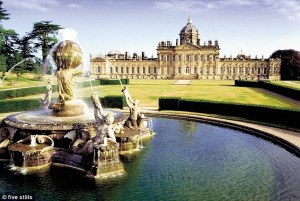 Castle Howard in Yorkshire
Castle Howard in Yorkshire
How does one in middle age recover the lost joy, innocence, and love of youth? Is this possible? Where does one start?
Such a quest frames the narrative of Brideshead Revisited (1981), one of the most highly acclaimed British miniseries ever produced. Adapted from the novel by Evelyn Waugh, Brideshead Revisited centers on 40-year-old army officer Charles Ryder as he reflects upon his past in search of meaning.
 Jeremy Irons as the 40-year-old Charles Ryder
Jeremy Irons as the 40-year-old Charles Ryder
Bored, apathetic, spiritually moribund, and middle-aged in every sense of the term, Charles Ryder (Jeremy Irons) finds himself unexpectedly billeted in 1944 at the grand country house, Brideshead, where he has known his happiest moments and greatest loves. Serendipitously reintroduced to Brideshead, Charles embarks upon a voyage of recollection. Most of the series’ narrative is presented in flashback.
Charles is introduced to Brideshead during the spring term of his first year at Oxford. Through a series of memorable events ranging from the redolent to the sublime, Charles meets Lord Sebastian Flyte (Anthony Andrews), the second son of the aristocratic Roman Catholic Flyte family. Smitten with Sebastian’s golden-haired beauty and warmth, and overwhelmed by the Flytes’ wealth and sumptuous surroundings, Charles becomes Sebastian’s closest friend and constant companion. Together they share holidays at Brideshead, where Charles becomes acquainted with Sebastian’s family.
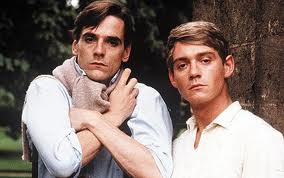 Charles and Sebastian at Oxford
Charles and Sebastian at Oxford
The Flytes’ Roman Catholicism affects each member of the family differently and profoundly. A self-consciously passive observer, Charles nevertheless finds himself embroiled in the family dramas.
Sebastian’s mother, Lady Marchmain (Claire Bloom), is a devout Catholic whose primary concern is the family’s welfare. Whether Lady Marchmain utterly fails to understand Sebastian’s character, or whether she understands him only too well, is a central question the series leaves unanswered.
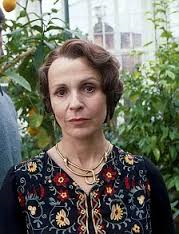 Claire Bloom as Lady Marchmain
Claire Bloom as Lady Marchmain
Sebastian’s father, Lord Marchmain (Laurence Olivier), converted to Catholicism in order to marry into the Marchmain family. When we first meet him, he has fled England and the Catholic church and set up housekeeping in Venice with his beautiful Italian mistress.
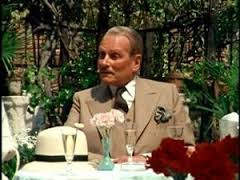 Laurence Olivier as Lord Marchmain
Laurence Olivier as Lord Marchmain
Sebastian’s older brother, Lord Brideshead, or “Bridey,” (Simon Jones) is a serious Catholic intellectual who is thoroughly content shaping his life around his Church. Bridey’s fluency with Catholic principles and his inclination to introduce them into casual conversation are alternately fascinating and frightening to the defiantly Agnostic Charles.
The glamorous Lady Julia Flyte (Diana Quick) is a fallen Catholic. When we meet her, she has just finished her first London season. Acutely aware of the limits her Catholicism imposes on her marital prospects and of the restrictions the Church places on women, Julia struggles to reconcile her desire for a modern life with the dictates of her ancient faith.
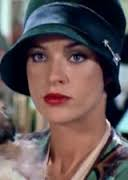 Diana Quick as Lady Julia Flyte
Diana Quick as Lady Julia Flyte
Lady Cordelia Flyte (Phoebe Nicholls) is a 13-year-old convent school pupil when the series begins. She is a fervent Catholic who eventually answers the Church’s call to service during Europe’s chaotic 1930s. Cordelia is also the only character in the story who understands Sebastian and possibly the only one who loves him.
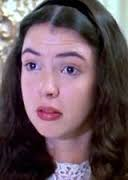 Phoebe Nicholls as Lady Cordelia Flyte
Phoebe Nicholls as Lady Cordelia Flyte
Sebastian is the emotional center of Brideshead Revisited even when he is absent from the screen. Anthony Andrews infuses the character with such beauty, grace, and poignant vulnerability that the viewer falls in love with Sebastian as Charles does. Sebastian’s burgeoning personal struggles through the series’ first several episodes are devastating to watch. His absence from later episodes is an inevitably painful void.
The source of Sebastian’s anguish is never made clear. Having seen the miniseries several times now, I am inclined to agree with the adult Cordelia’s belief that all of Sebastian’s problems stem from his resistance to his true vocation.
Sebastian’s heart is riven by diametrically opposed impulses, one, a longing for the comforts, rules, precepts, and promise of redemption offered by the Catholic church; the other, his rejection of Catholicism and its proponents in his life – most especially his mother – that drives him to destroy the repository of his Catholic impulses, himself.
Because Charles is not a Catholic, and because (as we learn in the series) he is markedly lacking in compassion, he is ill-equipped to understand Sebastian’s behavior. Sebastian’s gradual alienation from his only friend exacerbates his misery and accelerates his decline.
When we last encounter Sebastian, he has fallen into a perverse living arrangement that enables him to indulge simultaneously his penchant for Catholic service and his impulse for self-destruction.
The Brideshead Revisited miniseries is an artistic masterpiece. Its writing is outstanding. The acting is uniformly excellent. Especially noteworthy are John Gielgud‘s wickedly funny turn as Charles’ passive-aggressive father Edward Ryder and Nickolas Grace‘s portrayal of the flamboyant Anthony Blanche, voluptuary and sage.
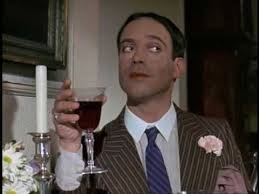 Nickolas Grace as Anthony Blanche
Nickolas Grace as Anthony Blanche
The production spared no expense in presenting a visual cornucopia of settings, costumes, vintage cars, trains, and Art Deco interiors. Brideshead’s stand-in, the stunning Vanbrugh-designed Castle Howard, is a character unto itself.
Here Sebastian introduces Charles to the Brideshead estate during a magical summer holiday.
In this scene set in Venice, Lord Marchmain’s mistress, Cara, tactfully cautions Charles about the Marchmains and Sebastian.
At least as indelible in memory as the series’ lavish settings is its plaintive, iconic chamber music score composed by Geoffrey Burgon. An except of the score is presented here.
Brideshead Revisited is somewhat unusual among dramas written in first person in that the narrator is not a completely sympathetic character. As the story unfolds, the viewer sees that Charles can be cold, selfish, cruel, standoffish, and judgmental to an extent to which he himself is apparently unaware.
As an aside, Charles Ryder is the first in a long line of obsessed characters portrayed on film by Jeremy Irons. (See The French Lieutenant’s Woman, Damage, M. Butterfly, Die Hard with a Vengance, Lolita, and Longitude.)
The Brideshead Revisited miniseries is available in a new 30th Anniversary DVD or Blu-ray collection. Complete episodes are also available on YouTube.
Since this snowy winter promises to linger for weeks to come, I strongly recommend Brideshead Revisited as a sumptuous, heartwrenching, and thought-provoking viewing experience. I promise you will never forget it.

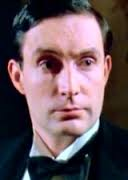
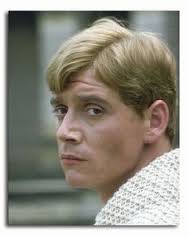
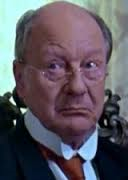
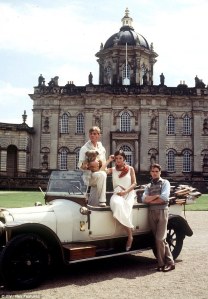
I share your passion for this series, which was broadcast when i was a student at Oxford, where I remember fellow students cashing in by offering “Brideshead Tours.” I liked the more recent feature film – but I LOVE the series for exactly the reasons you set out.
I disagree with you on one – possibly central – point. Sebastian is tortured because he knows he is gay, at a time whan homosexuality was illegal in Britain, and an affront to the Catholic Church. He knows he cannot be open about his sexuality and remain in a devoutly Catholic aristocratic family. But nor can he pretend to be straight, by indulging in a sham marriage as others in his situation did. Eventually he does choose, to his his family’s dismay, and ends up caring for a whining, unpleasant, physically ill and very self-centred man. That his chosen one is also German seems an almost deliberate affront to his family and to everything he has left behind in Britain.
I watched the whole series again last year, and writing this makes me want to start all over.
On the subject of UK mini-series – the wonderful Wolf Hall reaches its conclusion tonight. It’s been years since I have had a regular weekly date with the TV set.
LikeLiked by 1 person
It’s Lord Flyte who inherited Brideshead, not Lady Marchmain.
LikeLiked by 1 person
Of course. You’re right. I’ll make the fix. 🙂
LikeLike